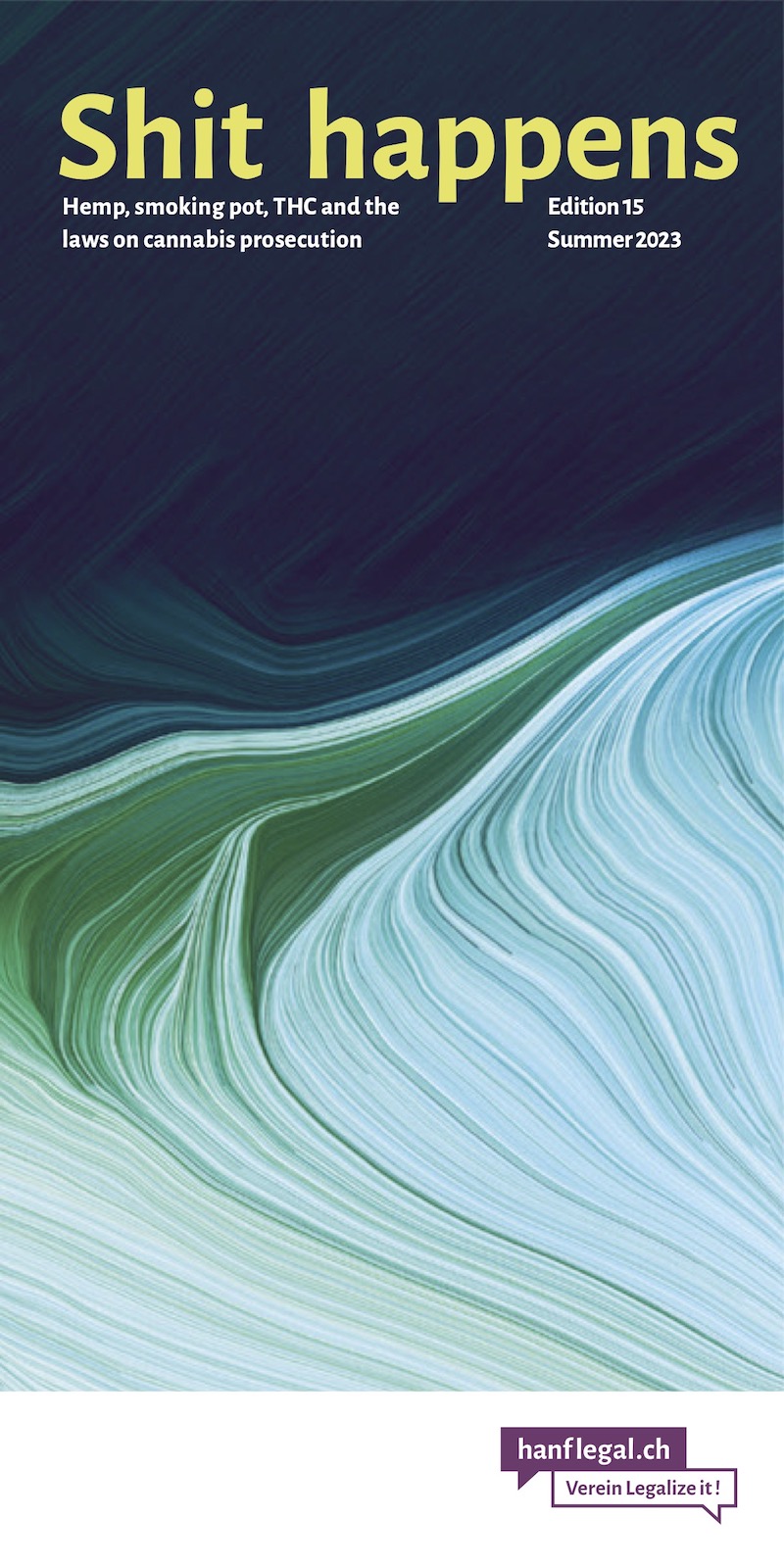- THC & Law:
A new multi-year political cycle begins
The hemp initiative was submitted in January 2006 with 106,314 signatures. The Federal Chancellery has recounted and declared it valid in February with 105'994 signatures. Thus it comes compellingly to an intensive discussion with referendum.
Wording of the initiative
The initiative calls for the following four points in a new hemp article 105a to be created, which we comment on in two parts:
“1. the consumption of psychoactive substances of the hemp plant as well as their possession and acquisition for personal use shall be exempt from punishment.
2. the cultivation of psychoactive hemp for personal use shall be exempt from punishment.”
The first two articles are mandatory law and can be applied immediately after the initiative is adopted. This would completely decriminalize all THC users in Switzerland. We would therefore be allowed to ingest, possess, buy or even produce THC products ourselves and no one would be allowed to punish us for such actions anymore or take away weed and hash. Sharing, however, is not listed here as exempt from punishment - here the legislation would have to decide whether, for example, passing on a joint would remain punishable or, in the case of joint consumption, for example, would also become exempt from punishment. The first two articles thus aim at a release of the individual, personal handling of THC products.
“3 The Confederation shall issue regulations on the cultivation, production, import and export of, and trade in, psychoactive substances of the hemp plant.
(4) The Confederation shall take appropriate measures to ensure that adequate account is taken of the protection of minors. Advertising for psychoactive substances of the hemp plant as well as advertising for the handling of these substances shall be prohibited.”
Implementation in legislation
These provisions cannot be applied immediately. More detailed legislation is needed here (and it may well be years before this is in force). Point three merely requires that such legislation be created. In this regard, the legislator is quite free in its design. It can therefore determine who is allowed to trade THC-rich hemp commercially under which conditions with which tax consequences, accounting obligations and control mechanisms. It is mandatory that there must be a ban on advertising, both for the products hash and weed as well as for consumption. In addition, the protection of minors must be taken into account - but here again there is more leeway. It would be conceivable to ban the sale of the products to under-16s, but also to under-18s. It would also be possible that no one would be allowed to legally sell THC products to young people, or that only very special places would be allowed to do so. The last two articles are therefore aimed at commercial trafficking. This is to be possible, but the exact conditions can be freely defined by the parliament, i.e. more restrictive or more liberal.
What would remain
Nothing would change in the current repressive approach to road traffic if the initiative were adopted. These laws and, above all, the relevant ordinance will remain in force even after the initiative is adopted. And here, a person with minimal traces of THC in his blood is already considered unfit to drive (which is fined and results in a driving ban) or someone who regularly consumes THC products is considered a drug addict anyway and is therefore also unfit to drive. The initiative does not change this legal situation. Likewise, schools, businesses and other institutions can continue to prohibit the consumption of THC products on their premises - just as they can prohibit the consumption of alcohol and tobacco. The initiative only demands that THC-users may no longer be hunted down with criminal law. But one really has to be aware: The vast majority of initiatives fail in the popular vote, and it would be a miracle if this initiative were accepted. But the value of an initiative lies in the discussions it triggers and often parts of it are implemented by the legislator. Perhaps the first two articles?
How does the cycle of an initiative work?
After the submission and the declaration of validity by the Federal Chancellery (which happened in February 2006), the concern of the initiative comes to the Federal Council. Within 12 months, the Federal Council has to prepare a message to the Parliament. If it presents a counter-proposal, it may take 18 months. Subsequently, the business comes to the parliament. There, first the Commission for Social Security and Health, then the First Council (National Council or Council of States) must deal with the matter. Then follows the commission of the second council and the second council itself. This work must be completed by 30 months after the declaration of validity. If a counter-proposal is prepared, it may take 12 months longer. Then the final vote takes place in both councils: Is the initiative recommended for approval or rejection? Is there a counter-proposal? At the latest 10 months later, the referendum on the initiative (and possibly the counter-proposal) must take place. This gives a maximum of 52 months. Starting from February 2006, June 2010 would be the last possible date. But it could also be faster: It could also take 40 months (without a counter-proposal, this would be the maximum time), or less, if the Federal Council and Parliament move the business forward quickly. However, one must always keep in mind that the prescription of heroin to severely addicted persons will expire at the end of 2009. So from then on, heroin can no longer be dispensed by doctors. But many politicians who deal with drug issues certainly want to clean up this business. And resources are limited.
Support our work with a donation:
Bank transfer
Account number (IBAN):
CH02 0900 0000 8709 1354 3
Full account details
Or scan this QR code with your eBanking App (ZKB, Revolut, Postfinance, …):

Or open/share the QR code as PDF file with your eBanking App.
Credit card
Donate via credit card
Verein Legalize it!
Quellenstrasse 25
8005 Zürich
Threema ID 7NH65RBY
Don’t miss anything! Follow us on social media:


